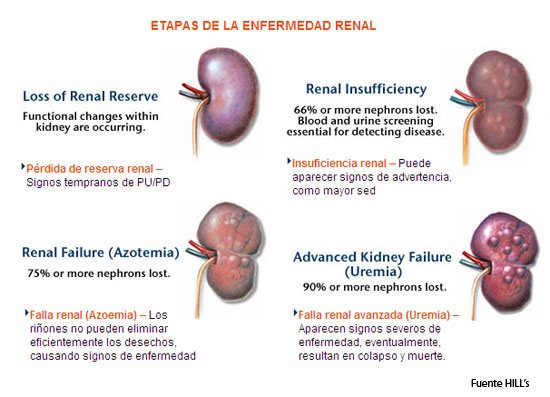Kidney disease is a common and serious clinical process in dogs and cats. Fortunately, veterinary medicine has achieved great medical and therapeutic advances for the treatment of these disorders.
Types of kidney diseases
There are many causes for renal alterations. Hereditary forms can be observed in dogs and young cats in which development and normal maturation of his kidneys has been insufficient. However, Renal alterations are observed more frequently in adult cats and dogs, and they are the result of damage caused by infectious diseases, toxins or immunologic disorders. Kidney disease that occurs suddenly is called acute. If disease progression is gradual, is called chronic.
What are renal alterations?
The kidneys perform several functions. One of its primary missions is the filter the blood to extract from it the toxic products of metabolism. In addition, the kidneys are collaborating on the maintenance of adequate levels of water balance, the acid/base balance and mineral levels and electrolyte of the dog or cat. Any State which impair the kidneys may alter these functions. Fortunately, the kidneys have a great reserve capacity and can compensate for the existence of a wide lesion. You can get up to a 75% renal tissue non-functional before clinical symptoms in the animal seen. But when they reach these proportions of injury, the kidneys are unable to completely clean the blood and toxic substances are beginning to accumulate. The inability of the kidneys to perform its normal functions is called renal failure. Acute renal failure (IRA) be prouce quickly. The swelling of the kidney or the decrease in blood flow to the kidneys damages its capacity to produce urine. When toxins increase in blood, symptoms may appear as depression, lethargy, loss of appetite or vomiting. In the chronic renal failure (IRC) the onset of symptoms appears slower. Initially, can be seen only an increase in the amount of water that the dog or cat eat (polydipsia) and in the amount of urine produced (polyuria). Progresses the alteration of kidney, toxic waste from animal products increase and it may be depression, diarrhea and vomiting.
Diagnosis of the insurenal FFICIENCY
If your veterinarian suspects that its but or cat suffers from kidney failure, You may need to perform various tests for confirmation. These may include blood tests to determine the levels of toxic metabolic products present in the blood and urine test to verify their possible alterations. The realization of x-rays may be necessary in some cases (X ray), special analysis and even a renal biopsy.
Treatment of renal alterations
After verification of the causes and the severity of the status of animal, your veterinarian will begin appropriate treatment. Since one of the most important functions of the kidney is the maintenance of water balance, You must ensure that your dog or cat have free access to water. If you are dehydrated it may be necessary to the establishment of a fluid therapy by the veterinarian. Another important aspect in the treatment of the dog or cat may consist of the supply of a specific diet for animals with kidney failure. Depending on the cause of the renal failure, the use of antibiotics and other medications may be necessary to also.
Import itCIA's nutrition
Diet plays an important role in the treatment of renal diseases. The diet aims to reduce the ingestion of protein and phosphorus to promote the fair balance of total nutrients. This can be achieved by increasing the contribution of calories coming from carbohydrates and fats, as well as providing protein of high quality in small quantities. A special diet can also help the balance of electrolyte balance and vitamin and mineral levels which kidney failure could have altered. Patients with kidney failure benefit from a decrease in the amount of sodium in their diets, as well as the increase of the vitamins of the B-type.
Administer to your pet that medication prescribed to you by your veterinarian and in the way that he tells you. Special diets are a major part of a careful global plan to ensure your health. Give only the diet recommended by your veterinarian. As in any change in diet, It is better to do it gradually over several days.Provide free access to clean water throughout the day. Find without enough water can lead to dehydration and worsen its State. Avoid stress, the excessive strain and tension. Get a quiet and comfortable environment, avoiding sudden changes in temperature.





